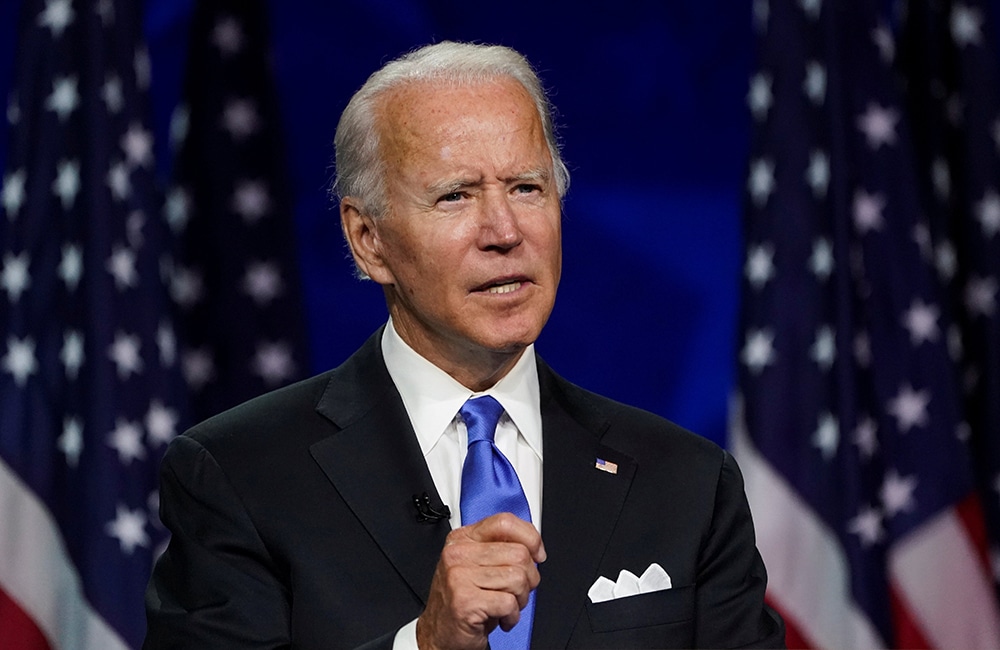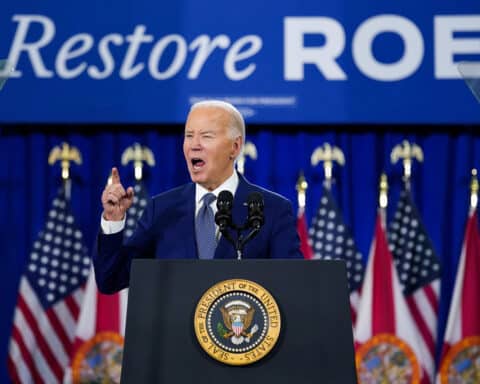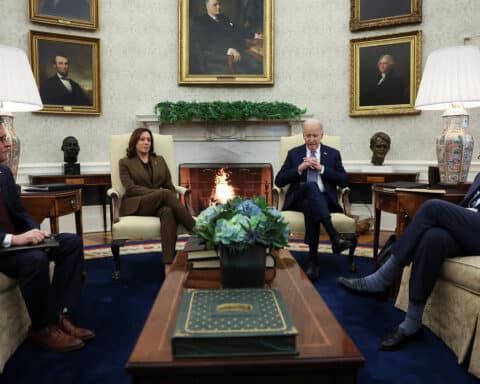Polarization. Division. Friends and family turning on one another. A pandemic. Widespread protests against injustice. Riots. The death of a liberal Supreme Court justice, and the nomination of a conservative woman to take her place.
And, in a few short weeks, Election Day will be upon us.
In our editorials this summer and fall, we have addressed this discord. But political division, in and of itself, is not the problem. A healthy society can and will engage in healthy debate. We are not a healthy society. But we can be one — and, as Catholics, we can lead the way.
In this special issue, we are presenting four points of view on the 2020 U.S. presidential election. The authors disagree with one another. As an editorial board and as individuals, we disagree with some of what each author has to say. But we and they are united in one purpose: to provide a model for charitable discussion of the four major options that we as Catholic citizens must consider as we approach the ballot box.
In this essay, Sam Rocha, associate professor of philosophy of education at the University of British Columbia in Vancouver, makes the Catholic case for Joe Biden.
The U.S. Conference of Catholic Bishops in “Forming Consciences for Faithful Citizenship” affirm that voting is not only a political act. More fundamentally, it is a moral act. The Church understands voting as a moral exercise of prudential judgment by a well-formed conscience in the interest of the common good of society as a whole.
The Church does not exhort U.S. Catholics to vote as a social interest or identity group. We are called to vote in a manner consistent with the universal call to holiness. With these moral and theological foundations, voting will not be easy. “Catholics may feel politically disenfranchised, sensing that no party and too few candidates fully share the Church’s comprehensive commitment to the life and dignity of every human being from conception to natural death,” they note. Nonetheless, they insist that “this is not a time for retreat or discouragement; rather, it is a time for renewed engagement.”
Using the Church’s moral understanding of politics and answering her call for renewed engagement, I present this case to vote for Joe Biden in the 2020 presidential election. I rely upon two principles: social realism and minimal reason.
The bishops rightly assume that the Catholic who votes must be a rational person, capable of fulfilling the requirements of minimal reason. If these are the assumed characteristics of the voter, why not use them for the candidate as well?
By “social realism,” I mean a sense of what is actionable today. Social realism concedes that there are better ideal options but acknowledges, too, that they are not real. There are also perhaps better real options we could choose as individual voters — for example, third parties, write-ins or abstentions, but these reflect an individualistic rather than social option, because they are ultimately forms of self-expression, not public participation. Social realism, then, asserts that there are only two real and social options: President Donald Trump or former Vice President Joe Biden.
By “minimal reason,” I simply mean the lowest standards that are nonetheless sufficient to call someone a rational person.
These principles respond directly to the bishops’ instruction in “Faithful Citizenship.” Social realism accepts their exhortation to engage by agreeing that political engagement must correspond to its social reality. One might try to do this in a negative way by taking third-party or write-in options or abstaining as a conscientious objector, but this would not be real engagement, because it ultimately ignores the fundamentally social nature of this reality. I expect that those voting for Trump agree with this.
Social realism also affirms the bishops’ teaching: “As Catholics we are not single-issue voters.” Single-issue voting violates the principle of social realism.
Minimal reason emerges from social realism. When we consider the social reality of the de facto two-party system in the United States, within the full scale of issues, which candidate meets the principle of minimal reason?
We should pause and ask how the principle of minimal reason relates to Church teaching. The essential theological content of faithful voting is the virtue of prudence lived through the praxis of prudential judgment. This requires a well-formed conscience. Our bishops warn that “Catholics must also understand that if they fail to form their consciences in the light of the truths of the faith and the moral teachings of the Church they can make erroneous judgments.”
But how is the conscience formed? Conscience is the human faculty of moral reason. The Church prescribes a number of conditions for its formation that begin with “a desire to embrace goodness and truth” and include a series of dispositions and practices. This entails a principle of minimal reason. For instance, the ability to read for understanding would be one. This may seem too basic. In this election, this minimalism is enough to inform a prudential judgment.
The bishops rightly assume that the Catholic who votes must be a rational person, capable of fulfilling the requirements of minimal reason. If these are the assumed characteristics of the voter, why not use them for the candidate as well? Which candidate best fulfills the principle of minimal reason? Who will read, listen and take counsel? Who will conduct himself as a rational person while in office? I believe that person is Joe Biden.
Biden’s platform is presented in 48 parts on his campaign website, each responding to a particular policy, issue and interest group. At minimum, this platform shows an ability to listen and take counsel that differs significantly from Trump’s record, which an unprecedented number of Republicans have publicly renounced in an act of conscience.
Like the aforementioned contentious Republicans, Catholics will surely not agree with every proposed policy or issue, but in Biden the principle of minimal reason is sufficiently present to a degree that one cannot find in Trump.
These reasons for voting for Biden are admittedly modest. I did not support him in the primary, and I did not vote for him when he ran alongside Barack Obama. However, if one engages realistically with American politics and rejects individualistic options as forms of disengagement (and single-issue voting as contrary to Catholic teaching), then minimal reason is a proportional moral and political criterion that carefully distinguishes Biden from Trump without overdetermining or overblowing the reasons to vote for Biden.
Without minimal reason, a person cannot be said to be rational. The irrational person is in no moral or political position to vote and much less to lead a nation. Even if the irrational person was able to make themselves useful to Catholic interests, doing so in the absence of minimal reason would, in fact, not be consistent with the Church’s moral understanding of politics consistent with the virtue of prudence and the proper exercise of conscience.
This election is about a return to minimal reason by voting in a socially realistic way for the candidate who displays sufficient standards, in word and deed, that make for a rational person. Along with his robustly consultative platform, Biden’s record of experience as a senator and vice president, especially his record of bipartisanship, all indicate that he is someone who reads, listens and takes counsel.
In the real contrast of Trump vs. Biden, it is my prudential judgment that Biden is clearly the only one who is minimally rational of the two.
Sam Rocha teaches at the University of British Columbia.





